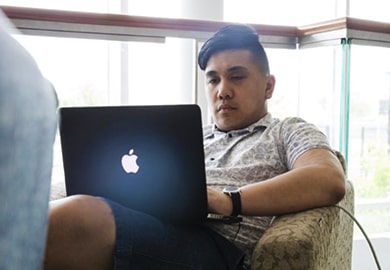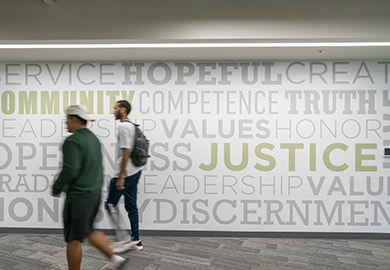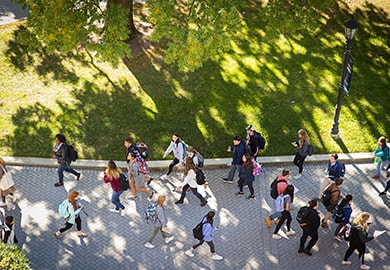Connect With Us
We are here to help you succeedThe Counseling Center offers experienced professionals who can help you explore many
different concerns. We value each person for their unique personality, perspective,
background, and culture. Learn more about us.
Online Scheduling Emergency Support
Spring 2026 Services at the Counseling Center
For the Spring 2026 semester, the Counseling Center will offer both in-person and
telehealth services. Learn more about our Available Services. Due to state licensing laws, students must be residing in Maryland to be eligible
for Let’s Talk, assessment, and therapy services.
If you are ill or have recently been exposed to someone with a contagious illness,
please call the Counseling Center prior to your appointment to discuss options for
rescheduling or telehealth sessions.
Online scheduling is available for currently enrolled Loyola students, residing in Maryland, to schedule
non-crisis Initial Appointments. For all other appointments, please call the Counseling
Center at 410-617-2273.
If you are needing immediate crisis support, contact the Counseling Center during
business hours (M-F, 8:30am-5pm EST) or the After-Hours Crisis Line at 410-617-5530.
You will always speak with a counselor, every single time after hours at 410-617-5530.
But if the call volume is high that means you might wait a few minutes for the next
available counselor. Don’t hang up, your call is important and will be answered. Learn more about Emergency Services.
Support starts here! The Counseling Center offers many options for students seeking support beyond individual
counseling. Explore resources and services that you can access today to begin your
wellness journey. All Loyola undergraduate and graduate students can access free 24/7
online mental health support with Togetherall. Sign up today.



Concerns we address
Announcements
The Counseling Center is closed when the University is closed. If you are experiencing
a mental health emergency during this time, please call our 24/7 crisis line at 410-617-5530
or Public Safety at 410-617-5911. You will always speak with a counselor after hours,
every single time, when calling 410-617-5530. If the call volume is high you may have
to wait a few minutes, for the next available counselor. Don't hang up, your call is important and will be answered. For additional support consider Togetherall - 24/7 free and anonymous online mental health support. All Loyola students can create
an account using their Loyola email. Learn more about Emergency Support Services.
If you have a scheduled appointment with the Counseling Center during the closure,
please expect communication via email or phone (410-617-2273) to help you reschedule
your appointment once the University is open.
2024-2025 Year in Review Newsletter
Loyola Counseling Center Land Acknowledgement
The staff at the Counseling Center humbly acknowledges and honors the Indigenous communities whose ancestral homelands and resources were stolen and colonized in the creation of this nation, state and campus. We recognize the Piscataway, Nanticoke, Lumbee, and Susquehannock as past, present, and future caretakers of this land.
A land acknowledgement is a small and insufficient step towards correcting the narrative and injustice of colonialism both past and present. While this small act will never erase the atrocities that have been endured by Indigenous peoples both locally and around the world, it is a part of our ongoing commitment to uplifting the sovereignty of Indigenous communities. We are therefore committed to resisting the oppression that takes many forms, including the attack on mental health, threat to the environment, and continued violence caused by systems of racism.
Events
Learn more about our events
Contact Us
Humanities, Room 150One flight up the turret entrance
Phone: 410-617-CARE (2273)
Call to schedule an appointment
Monday - Friday, 8:30 a.m. - 5 p.m.
REACT Online
REACT is an online video that explains how to help yourself or someone you care about cope in healthy ways after a distressing life event (such as a trauma, assault, or loss).